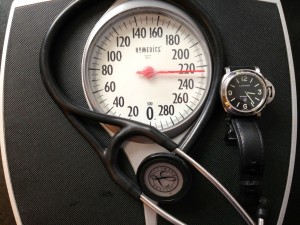 How many patients of mine say that they think the reason they are overweight is that they eat many of their calories at dinner or later? Maybe, according to a new study, they are partially right (especially if they are mice).
How many patients of mine say that they think the reason they are overweight is that they eat many of their calories at dinner or later? Maybe, according to a new study, they are partially right (especially if they are mice).
A group of mice were restricted to when they could eat were compared to a group of mice that could eat at all hours. Both groups were fed the same diet, the same number of calories, and there was no exercise involved (it is hard to get elliptical machines for mice). The mice that ate at all hours soon grew fat and developed symptoms of diabetes. But the mice on the eight-hour eating schedule didn’t – same diet. We reported these results last year in Timing of Meals Affects Weight Loss.
But what if we fed these mice different types of diets? Think of the diets that people associate with obesity, high fat, high fructose, high fat and fructose (I think this is called the donut diet), and then – for kicks – how about we feed some just plain mouse kibble (I have not seen a patient yet who eats mouse kibble, but lets go with this). Did you ever restrict what you can eat during the week but on the weekends cheat? Well, the scientists decided to try this.
Mice live about 40-52 weeks, so the experiment was over the majority of their lifespan (38 weeks) – that would be the equivalent of starting an experiment with people as they reach adulthood (around 20) until they are about 70 years old.
The results were that mice eating at all hours were generally obese and had something akin to type 2 diabetes (or metabolic syndrome) just like they discovered in their earlier study. But those mice that ate within a nine- or 12-hour time frame (started at 5 am, finished last bite at 5 pm) did not become obese, and stayed healthy, even if the mice were allowed to “cheat” on weekends. Then they took mice that had become obese, and restricted their food to the schedule and those mice lost some of the weight they had gained.
So can this affect humans? It is worth a try. But there are some caveats:
Can I eat what I want and restrict it to certain hours?
It is not what you eat, but how your body processes that food. If you are someone who processes fructose poorly, then eating foods that have a lot of sugar or high fructose corn syrup will still have a devastating metabolic effect on your body.
Can I just eat all my calories at once?
You could, although that caloric load is typically a lot, and the body has to decide what to do once those calories are processed into the body. It has to store them. Depending on one meal a day isn’t wise. Plus- if you snack, or drink coffee with some calories – then that is when the clock starts.
Should I start eating later and stop eating sooner?
Is Breakfast the most important meal of the day. You don’t have to have it if you don’t want it – and the calories you have for breakfast do count. So if you are not hungry – don’t eat. Wait. Once you start eating or drinking that clock is ticking.
Fat mice and rats die sooner- so I want the mice to eat a lot and all day. But for people – maybe it is time to do what so many of my successful patients do, to quote one: “I don’t eat after 6 pm.”
REFERENCES:
Cell Metab. 2014 Dec 2;20(6):991-1005. doi: 10.1016/j.cmet.2014.11.001.
Time-Restricted Feeding Is a Preventative and Therapeutic Intervention against Diverse Nutritional Challenges.
Chaix A1, Zarrinpar A2, Miu P1, Panda S3. PMID: 25470547
Cell Metab. 2012 Jun 6;15(6):848-60. doi: 10.1016/j.cmet.2012.04.019. Epub 2012 May 17.
Time-restricted feeding without reducing caloric intake prevents metabolic diseases in mice fed a high-fat diet.
Hatori M1, Vollmers C, Zarrinpar A, DiTacchio L, Bushong EA, Gill S, Leblanc M, Chaix A, Joens M, Fitzpatrick JA, Ellisman MH, Panda S.PMID: 22608008
